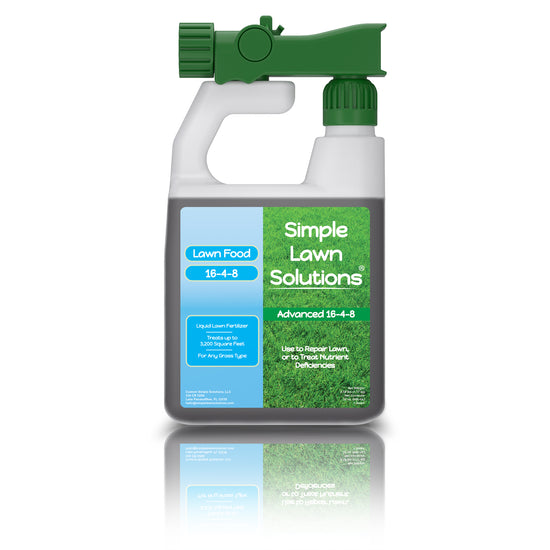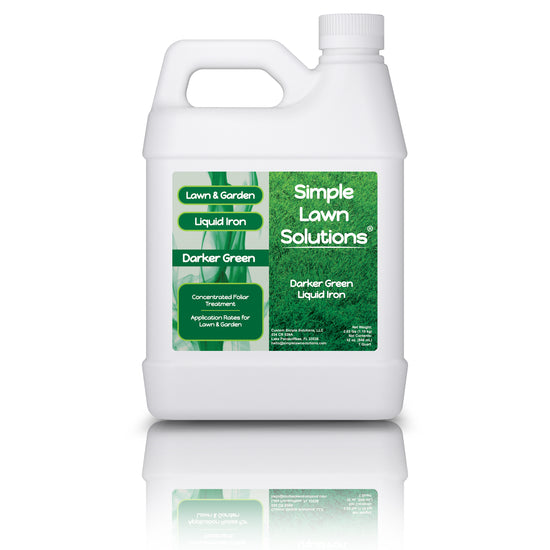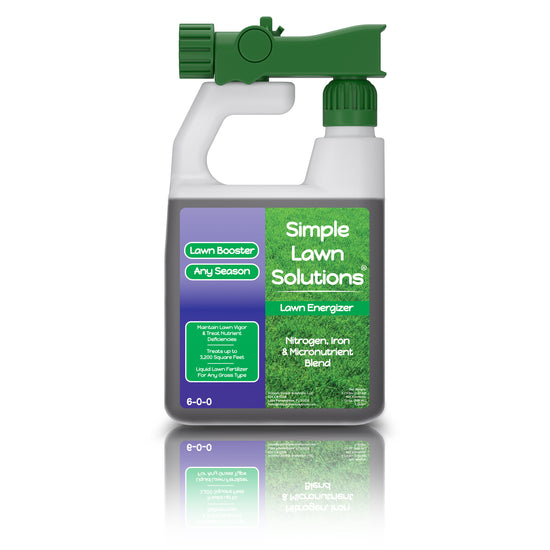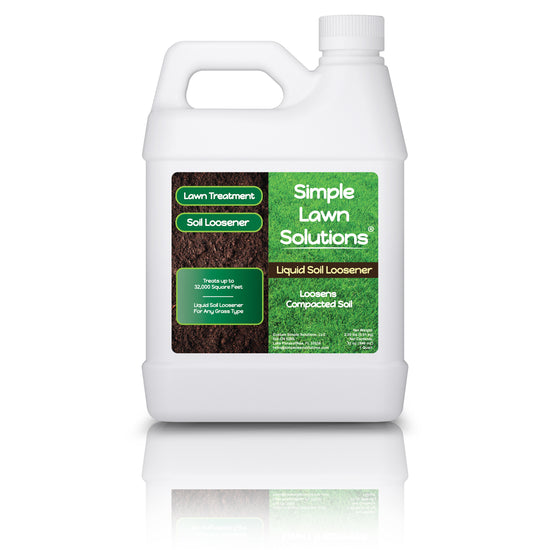Shopping for the right grass care products can be confusing and overwhelming, especially when you don't know what is causing your lawn issues. There are a variety of factors that can play into dry, brown, or patchy grass. You don't have to be an expert in lawn care to fix your grass issues - let your friends at Simple Lawn Solutions help guide the way to achieve a luscious lawn for all areas of grass care, starting with soil nutrients.
Whether you’re looking to improve your lawn care or have a better understanding of your soil, we want to help you break down the importance of different lawn ingredients like potassium, nitrogen, and other organic components. Let’s get started in learning about the importance of lawn care.
The Importance of Lawn Care
There is a sense of pride you get from attaining a well-maintained lawn, but keep in mind that there is more to excellent grass care than meets the eye. For proper lawn care, you will need to understand how soil, sunlight, water, and other elements all work together to provide the right environment for your grass to flourish.
In addition to regular mowing, weeding, and watering, there are two more easy processes to add to your lawn care routine to help with grass issues: lawn aeration and fertilization. Grass care issues could be coming from the ground, so it is essential to understand the nutrients that soil needs to thrive. The right fertilizer will help to mitigate any nutrient shortages. Along with proper nutrients and adequate lawn care, you can achieve an excellent lawn. Continue reading to learn about the benefits of going liquid with your lawn food and how adding this technique into your grass care routine can benefit your grass at the soil level.
Liquid Lawn Fertilizer Ingredients
Simple Lawn Solutions carries a variety of specially formulated lawn fertilizers. Whether your lawn requires an extra boost to grow tall, more durable blades, or better root development, we have the right formula for your lawn care needs.
Here are just three reasons why we love liquid fertilizer:
- Easy-to-use (no spreading equipment required)
- Well-mixed nutrients for uniform application
- Fast results
Our lawn food provides a balanced amount of macronutrients: nitrogen, phosphorus, and potassium, also referred to as N-P-K. These nutrients are essential for grass health and growth. Along with these macronutrients, the liquid fertilizer also contains a proprietary mix of other nutrients necessary to treat any deficiencies your soil may have or just to help maintain a healthy lawn.
Our liquid fertilizer is homogeneous, so you will distribute the nutrients to your lawn equally during the application, making for more accessible grass care. This fertilizer penetrates the soil, enhancing the health of both your grass and soil. With the right fertilizer and proper lawn care techniques, you will be on your way to vibrantly green and growing grass.

Conducting a Soil Test
Are you wondering how to tell which macronutrients your lawn needs? We recommend conducting a soil test - this can be done at home or by a professional lawn care service. A soil test will tell you the pH of your soil, so you will know whether it is acidic, neutral, or alkaline. A soil test might seem complicated, but it is necessary if you want to know what nutrients your soil is capable of providing your lawn. Knowing the nutrient contents of your soil is beneficial for fertilization grass care, so you can be sure to add the right blend of N-P-K.
This test will also indicate which nutrients are lacking in your soil and should give you an idea of how much of that nutrient should be added back through fertilizer, to increase your soil’s health. We will be taking a deep dive into potassium, nitrogen, iron, and phosphorus and explore how you can combat these specific nutrient deficiencies. Consider adding a soil test to your annual grass care checklist.
Not sure what to do with the results of your soil test? We will also help to recommend a specific fertilizer for each nutrient deficiency that your soil may be experiencing. Now let us move on to learning all about nitrogen.
Nitrogen
It’s common for many plants, like turfgrasses, to be nitrogen-deficient. Nitrogen is the mineral element used in the greatest quantity by turf. Nitrogen is a component of many of the biochemical constituents of plants, including chlorophyll, amino acids, proteins, enzymes, and vitamins.
If your grass shows any of these nitrogen-deficient symptoms, it’s time to explore our nitrogen-rich lawn foods:-
Yellowing blades or leaves
-
Stunted, slow growth
-
Pale green color
-
Poor density
An excellent way to combat nitrogen-deficient soil is to use a lawn fertilizer with a high-nitrogen blend. The grass cannot adequately absorb nitrogen without an established root system, which echoes the benefits of fertilizer use. Proper lawn care techniques work hand-in-hand with fertilization. If you fertilize stunted grass roots and your grass is unable to properly uptake the required nutrients, then applying a nitrogen-rich fertilizer to your grass will not be as impactful.
In the case of nitrogen, you can have too much of a good thing. An excess of nitrogen in the soil is harmful to the ground and makes a harsh environment for your grass to thrive. Aim to deliver 3-4 lbs of nitrogen/1000 sq. ft. of lawn per growing season. Adjust as necessary based on the response of your lawn.
Phosphorus
Phosphorus is the second macronutrient that is part of the acronym N-P-K, commonly used in lawn care terminology. The proper level of phosphorus in your grass is essential for root and early plant development. Sometimes referred to as “phosphate,” phosphorus is an important part of many plant compounds that are essential for growth. Its primary role is in the storage and transfer of energy. Without sufficient P, normal growth and development cannot occur. However, it is possible to have too much or too little phosphorus in your soil.
Our 3-18-18 blend of lawn food is high in phosphorus and potassium and works to increase the phosphates’ mobility. This carefully crafted blend aims to provide critical nutrients for top grass and root growth.
Remember to assess your soil needs seasonally so you can apply the right blend of fertilizers and avoid overexposing your lawn to certain nutrients. Too much phosphorus in soil can cause stunted turf growth and phosphorous leaching into waterways, so it is essential to pay close attention when applying this nutrient. We offer phosphorus-free fertilizers, such as our 15-0-15 blend, if your soil contains an adequate amount of this nutrient.
Consider testing your soil for phosphorus to ensure your soil has not too much and not too little, but an adequate amount of this nutrient. Let's learn about our third macronutrient, potassium, and how the lack of this nutrient in the soil can disturb your lawn health.
Potassium
Potassium is involved in carbohydrate formation, photosynthesis, enzyme activation, and the formation of proteins. Potassium plays a role in photosynthesis, and carbohydrate production is reduced when K is deficient. Potassium can enhance the plant’s endurance to stress if a deficiency is present.
Our high potassium lawn food works in even the most potassium-deficient yards. This potassium-rich formula works to strengthen and preserve your lawn in the colder months so that you can show off a healthy, full turf in the spring and summer. If you don't need a high potassium dosage, check out our 16-4-8 lawn food, a complete, well-rounded fertilizer. It consists of a blend of crucial macronutrients, including potassium. This high-quality, potassium-rich feed will aid in reviving your lawn to a healthy state. Our specially formulated liquid fertilizers are safe for all grass types, including Bermuda, Kentucky Bluegrass, and Fescue. Conduct a soil test and see if your turf can benefit from potassium-rich fertilization at the start of your seasonal lawn care routine.
Iron
Though it is not considered a vital soil macronutrient, iron is the fourth most prevalent nutrient found in soil and is a micronutrient. You can spot an iron deficiency in soil by the presence of iron chlorosis, or the yellowing of veins between grass leaves. This symptom is most common in younger grass, and in severe cases, coloring will be almost white in the leaf veins. You could be on the top of your game when it comes to grass care, but if your soil lacks vital nutrients, you will need to address the issue at the root.
When your grass lacks iron, it may compensate for the deficiency by creating a more acidic soil environment, which would create an imbalance. It's best to treat iron deficiency right away to keep your soil nutrients in harmony. When the nutrients in your soil are balanced, and you are applying the right and consistent grass care techniques, you will have no issues seeing your turf flourish.
For iron issues, we recommend using our Darker Green Liquid Iron. This fertilizer contains iron and key micronutrients that aid in healthy lawn care.

Lawn Aeration
Whether or not you need a lawn fertilizer or booster, there are still more tips to get you on your way to a healthy, luscious lawn.
Lawn aeration provides an opening for soil, water, and fertilizer to penetrate deeper into the soil, making this process the perfect predecessor to liquid lawn food application. So if your soil lacks potassium, nitrogen, phosphorus, or any micronutrients, consider aeration before adding a liquid fertilizer for faster results and a more profound impact on the soil.
The Grass Care Specialists
You don’t have to be an expert in lawn care to provide your soil with the right nutrients it needs for healthy, growing grass. Let the experts at Simple Lawn Solutions help to guide you in all areas of grass care. Whether your soil needs potassium, iron, nitrogen, or phosphorus, we have the right lawn food blends that your grass needs.
Want to learn more about our high-quality lawn care products? Visit us online to shop.









